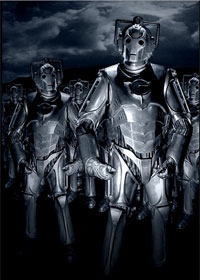Narz
keeping it real
Poor mouse.
By the way, what's with the kids in the forest bit?
By the way, what's with the kids in the forest bit?



Exactly. People can realise that there is a multi-tier demand and supply for all of these types of progress. If there's a paradigm that appeals to someone, then they can push for progress in that paradigm.Why not both?
This kind of research fascinates me, but I don't expect to see any kind of immortality in my lifetime.
Practical and commercial applications are technology.
Ideally, you'll want to be a customer for a finished product. The best way to get these types of products is to help them arrive more quickly.BTW can I sign up to be a Beta tester for some of these implants?
Well, acknowledging the difficulties shouldn't make you object to it philosophically. Sure it can't be done anytime soon, but I see no theoretical objection to it.Cyborgization is fine, but I draw the line at roboticization. As Perfection notes, the architecture of the brain is quite different from that of computers - and I expect it to stay that way long after computers become more powerful than brains at making complex subtle intelligent judgments. I share Gogf's worry in post #22.
So you deny things can go wrong?
Things our going wrong though. We may yet destory our planet (or at least it's ability to support the human species).Well what invention, what technical progress in the past has gone so terribly wrong that it actually jeopardized our species? I mean, we have the means to blow our planet more than a thousand times over, and yet we didn't do it, right?
We should give more credit to common sense. Just because something can be abused does not mean it will.
But yeah, I was maybe a bit too sarcastic. I do not deny that things can go wrong, I just think they won't.
Well, acknowledging the difficulties shouldn't make you object to it philosophically. Sure it can't be done anytime soon, but I see no theoretical objection to it.
Sure, if you replaced one single neuron at a time with its functional equivalent, you'd preserve the relevant causal powers of each little bit of your brain. But that would be insanely difficult and expensive - so, I wager, your scenario is not how it will actually work. Instead, a powerful AI will be developed which works by radically different principles, and ways to make excellent simulations of individual personalities and memories will be developed on that platform. And people who "take advantage" of this "immortality" will actually, IMHO, be committing a bizarre sort of suicide.
Yep, hindering scientific progress and Human V2.Masquerouge said:"Oh Noes the robots are evil because they're machines and do not have feelings! They can't love they're machines! They can't imagine! And thus they turn against us because they hate us! Wait I said they do not have feelings!"
"Oh Noes we've been playing God with ADN and now I have 5 arms and I'm a monster!"
There comes a point where "mere practicalities" plus philosophical subtlety mount into a philosophical objection. When the "merely practical difficulties" threaten to marginalize, or even obsolete, sentience-as-we-know-it, we have a problem. As I wrote in the "computers and human rights" thread:
If we emphasize the fact that robotic emotion and sensation are possible in principle (even if that is a fact) we're emphasizing the wrong fact. We should emphasize that in practice, what will be possible will (for a long time at least) only be the illusion of emotion and sensation.
This is more or less exactly how I responded to Aya-So's statement from the other thread.Consider this, if I connected my brain to an artifical nural-like network and allowed chemical and eletrical signals to travel between them, then waited two days, and stoped my heart so that my organic brain died. Would my concisousness still be "alive"?
Things our going wrong though. We may yet destory our planet (or at least it's ability to support the human species).
I definitely agree.Not saying we should all become technophobes, just that a bit more care is necessary,
more than we're even excersising right now with present technoglogy.
